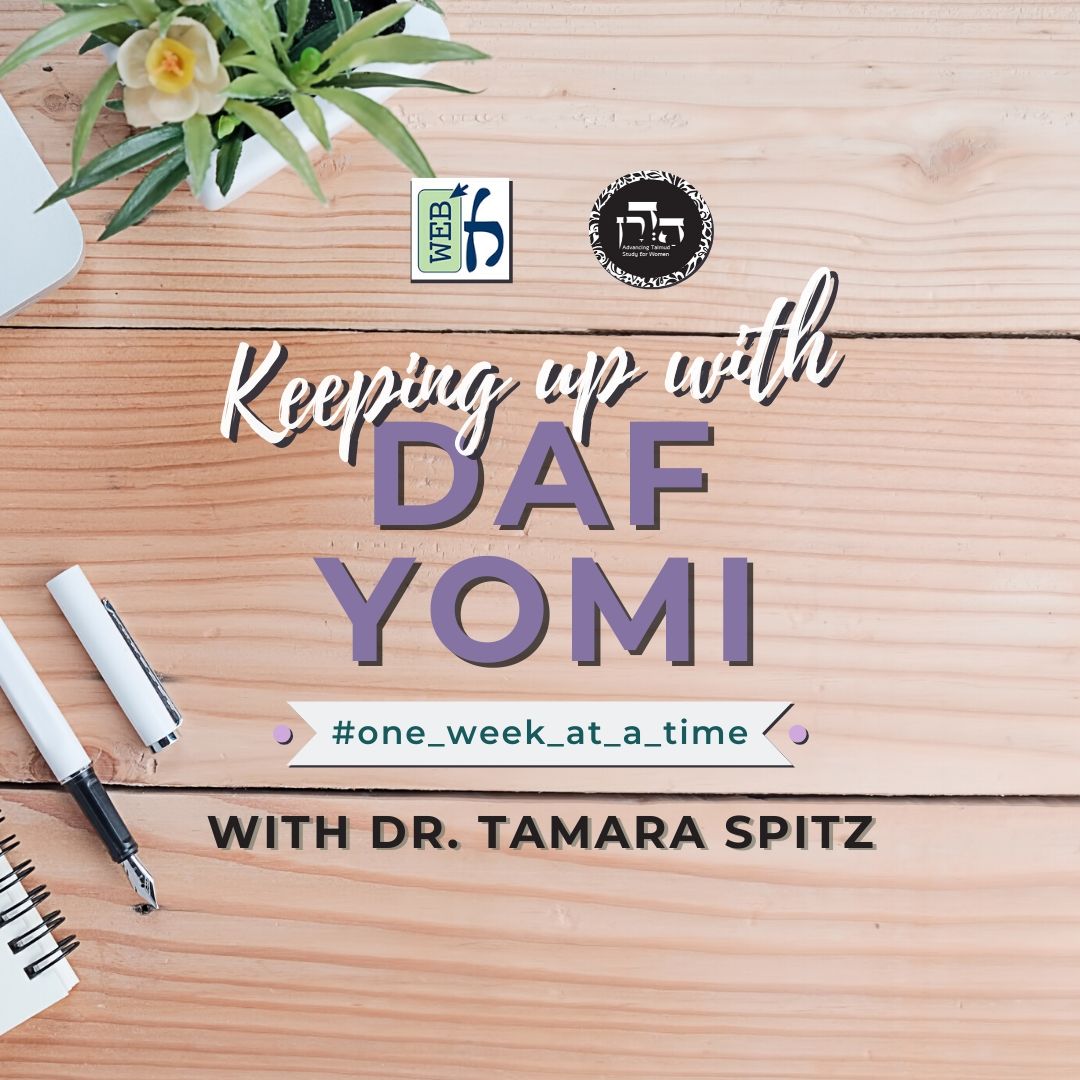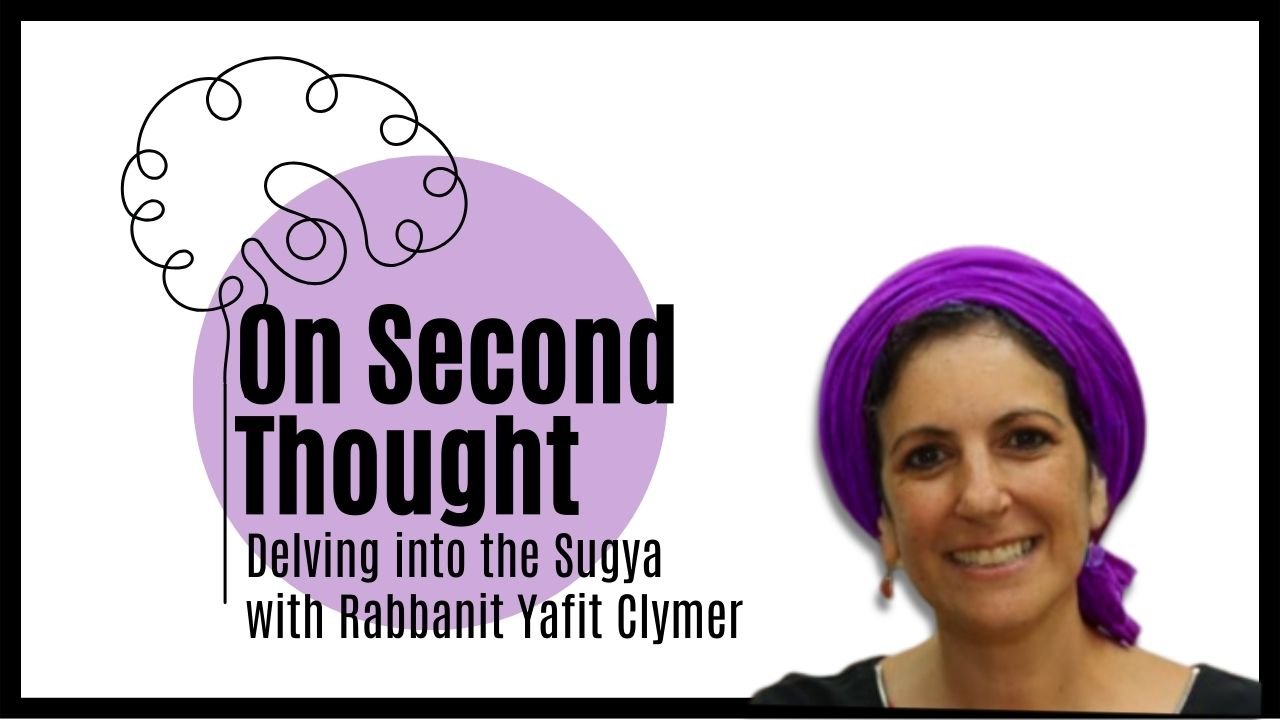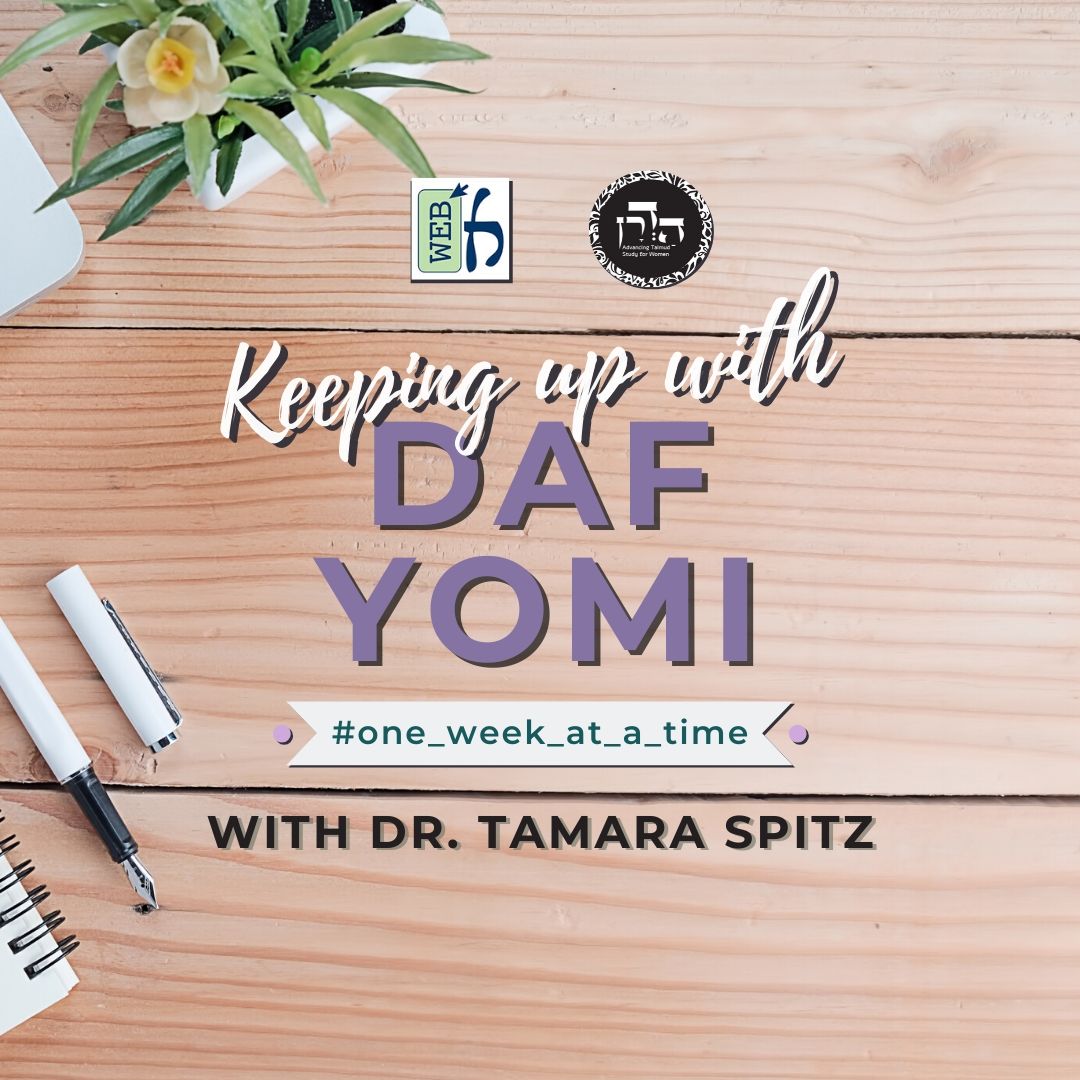Did Rabbi Yehoshua concede to Rabbi Akiva that one cannot learn from a case of meilah to a case of eating notar – regarding the questions if one ate notar from five different sacrifices, would one be olbigated to bring five sin offerings? Rabbi Akiva asked Rabbi Eliezer a quesetion about one who does many forbidden acts on Shabbat on various Shabbatot and only at the end finds out that is was forbidden – does one bring many sacrifices or just one? Rabbi Elizer answers that one is obligated to bring on each one and learns it from one who sleeps with many niddot. Rabbi Akiva disagrees and there is a back and forth – it is unclear if in the end Rabbi Akiva agrees with Rabbi Eliezer or not. Three interpretations are brought in the gemara regarding exactly what Rabbi Akiva asked (all agree it was two questions) and did Rabbi Akiva aceept Rabbi Eliezer’s answer in the end? Or did he accept for one and not the other?
This month’s learning is dedicated to the refuah shleima of our dear friend, Phyllis Hecht, גיטל פעשא בת מאשה רחל by all her many friends who love and admire her. Phyllis’ emuna, strength, and positivity are an inspiration.
Want to dedicate learning? Get started here:


Today’s daily daf tools:
This month’s learning is dedicated to the refuah shleima of our dear friend, Phyllis Hecht, גיטל פעשא בת מאשה רחל by all her many friends who love and admire her. Phyllis’ emuna, strength, and positivity are an inspiration.
Today’s daily daf tools:
Delve Deeper
Broaden your understanding of the topics on this daf with classes and podcasts from top women Talmud scholars.
New to Talmud?
Check out our resources designed to help you navigate a page of Talmud – and study at the pace, level and style that fits you.
The Hadran Women’s Tapestry
Meet the diverse women learning Gemara at Hadran and hear their stories.
Keritot 16
וְאִילּוּ עַל סְפֵיקוֹ, מֵבִיא אָשָׁם תָּלוּי לָא קָתָנֵי. מַנִּי הָא? אִילֵימָא רַבִּי עֲקִיבָא, לִיתְנֵי נָמֵי סֵיפָא: ״וְעַל סְפֵיקָן מֵבִיא אָשָׁם תָּלוּי״, דְּהָתְנַן: רַבִּי עֲקִיבָא מְחַיֵּיב עַל סְפֵק מְעִילָה אָשָׁם תָּלוּי!
The Gemara notes: And yet in the final case in the baraita, it does not teach that in a situation where he is uncertain whether he ate from it he brings a provisional guilt offering. Whose opinion is this? If we say it is the opinion of Rabbi Akiva, let him also teach in the last clause: For a case where he is uncertain whether he ate from them he brings a provisional guilt offering, as we learned in the mishna (22b) that Rabbi Akiva deems one liable to bring a provisional guilt offering for uncertainty about misuse of consecrated property.
אֶלָּא לָאו רַבִּי יְהוֹשֻׁעַ הִיא, וְקָתָנֵי: ״בַּחֲמִשָּׁה הֶעְלֵמוֹת – מֵבִיא חָמֵשׁ חַטָּאוֹת״, וּשְׁמַע מִינַּהּ: קַיבְּלַהּ מִינֵּיהּ!
Rather, isn’t the baraita in accordance with the opinion of Rabbi Yehoshua, who disagrees with the opinion of Rabbi Akiva and holds that one is not liable to bring a provisional guilt offering for uncertainty about misuse of consecrated property? And it teaches that one who eats notar from one offering cooked in five pots during five separate lapses of awareness brings five sin offerings, which indicates that if he did so during a single lapse of awareness he would be liable to bring only one sin offering, in accordance with the opinion stated by Rabbi Akiva in the mishna. And one can conclude from here that Rabbi Yehoshua accepted the refutation from Rabbi Akiva.
אֶלָּא אַדְּרַבָּה, מִסֵּיפָא, דְּקָתָנֵי: מֵחֲמִשָּׁה זְבָחִים אֲפִילּוּ בְּהֶעְלֵם (אַחַת) [אֶחָד] – חַיָּיב עַל כׇּל אַחַת וְאֶחָת, שְׁמַע מִינַּהּ: לָא קַיבְּלַהּ מִינֵּיהּ!
The Gemara responds: But on the contrary, one can infer otherwise from the latter clause of the baraita, which teaches: If he ate from five separate offerings, even during one lapse of awareness, he is liable to bring a separate sin offering for each and every one. One can conclude from this statement that Rabbi Yehoshua did not accept the refutation from Rabbi Akiva.
וְאֶלָּא מַאי אִית [לָךְ] לְמֵימַר, תַּנָּאֵי הִיא, דְּאִיכָּא תַּנָּא דְּקַיבְּלַהּ וְאִיכָּא תַּנָּא דְּלָא קַיבְּלַהּ?
Rather, what is there to say about this baraita? It must be said that it is a dispute between tanna’im, that there is a tanna who maintains that Rabbi Yehoshua accepted Rabbi Akiva’s refutation, and there is a tanna who maintains that Rabbi Yehoshua did not accept it.
אֲפִילּוּ תֵּימָא רַבִּי עֲקִיבָא הִיא, וְהַאי תַּנָּא סָבַר לַהּ כְּוָתֵיהּ בַּחֲדָא וּפְלִיג עֲלֵיהּ בַּחֲדָא, סָבַר לַהּ כְּוָתֵיהּ בְּהַעֲלָמָה, וּפְלִיג עֲלֵיהּ בִּמְעִילוֹת.
But once the baraita is interpreted in accordance with two different tanna’im, you may even say that the earlier clause of the baraita is in accordance with the opinion of Rabbi Akiva and not Rabbi Yehoshua. And this tanna of the baraita holds in accordance with the opinion of Rabbi Akiva in one matter and disagrees with his opinion in one matter: He holds in accordance with the opinion of Rabbi Akiva with regard to a lapse of awareness, that if one eats from five offerings during a single lapse of awareness he is liable to bring only one sin offering. But he disagrees with his opinion with regard to misuse of consecrated property, as he does not deem one liable to bring a provisional guilt offering for uncertainty about whether he misused consecrated property.
הֵיכִי דָמֵי חָמֵשׁ מְעִילוֹת? אָמַר שְׁמוּאֵל: כְּאוֹתָהּ שֶׁשָּׁנִינוּ: חֲמִשָּׁה דְּבָרִים בָּעוֹלָה מִצְטָרְפִין: הַבָּשָׂר, וְהֶחָלָב, וְהַיַּיִן, וְהַסֹּלֶת, וְהַשֶּׁמֶן.
§ The mishna teaches that if one eats five pieces from a single offering, each of which was cooked in a separate pot, he is liable to bring five guilt offerings for misuse of consecrated property. The Gemara asks: What are the circumstances which require five guilt offerings for misuse of consecrated property? Shmuel says: The five pieces must be from separate parts of the offering, like that which we learned in a mishna (Me’ila 15b) with regard to a different topic: Five items from a burnt offering combine to form an olive-bulk that renders one liable for sacrificing an offering outside the Temple: The meat, and the forbidden fat, and the wine from the libations of the burnt offering, and the fine flour from the meal offering brought with the libations, and the oil for mixing with the meal offering.
חִזְקִיָּה אָמַר: כְּגוֹן שֶׁאָכַל מֵחֲמִשָּׁה אֵבָרִים. רֵישׁ לָקִישׁ אָמַר: אֲפִילּוּ תֵּימָא בְּאֵבֶר אֶחָד, מַשְׁכַּחַתְּ לַהּ בְּכָתֵף. רַבִּי יִצְחָק נַפָּחָא אָמַר: כְּגוֹן שֶׁאָכַל בַּחֲמִשָּׁה מִינֵי קְדֵירָה. רַבִּי יוֹחָנָן אָמַר: כְּגוֹן שֶׁאָכַל בַּחֲמִשָּׁה טְעָמִים.
Ḥizkiyya says: The obligation to bring five guilt offerings applies in a case where he ate from five different limbs of one offering. Reish Lakish says: You may even say that he ate from one limb, and you find this in a case where he ate from the shoulder of an offering, which has several different sections. Rabbi Yitzḥak Nappaḥa says: It applies in a case where he ate pieces of meat prepared as five different types of cooked dishes. Rabbi Yoḥanan says: It applies in a case where he ate five pieces of meat that had five different flavors, as they were prepared with different types of seasonings.
מַתְנִי׳ אָמַר רַבִּי עֲקִיבָא: שָׁאַלְתִּי אֶת רַבִּי אֱלִיעֶזֶר בְּעוֹשֶׂה מְלָאכוֹת הַרְבֵּה בְּשַׁבָּתוֹת הַרְבֵּה מֵעֵין מְלָאכָה אַחַת בְּהֶעְלֵם (אַחַת) [אֶחָד], מַהוּ? חַיָּיב אַחַת עַל כּוּלָּן, אוֹ חַיָּיב עַל כׇּל אַחַת וְאֶחָת?
MISHNA: Rabbi Akiva said: I asked Rabbi Eliezer with regard to one who performs multiple prohibited labors on several Shabbatot, and all those labors were subsumed as subcategories of one primary category of prohibited labor, and he performed them during one lapse of awareness. What is the halakha? Is he liable to bring one sin offering for unwitting performance of all these labors or is he liable to bring a sin offering for violation of each and every one of the labors?
אָמַר לוֹ: חַיָּיב עַל כׇּל אַחַת וְאַחַת, מִקַּל וָחוֹמֶר, וּמָה נִדָּה שֶׁאֵין בָּהּ תּוֹצָאוֹת הַרְבֵּה וְחַטָּאוֹת הַרְבֵּה – חַיָּיב עַל כׇּל אַחַת וְאֶחָת, שַׁבָּת שֶׁיֵּשׁ בָּהּ תּוֹצָאוֹת הַרְבֵּה וּמִיתוֹת הַרְבֵּה – אֵינוֹ דִּין שֶׁיְּהֵא חַיָּיב עַל כׇּל אַחַת וְאֶחָת?
Rabbi Eliezer said to Rabbi Akiva: He is liable to bring a sin offering for violation of each and every one of the labors, and this is derived from an a fortiori inference: Just as in the case of a menstruating woman, with regard to whom there are not multiple actions that result in transgression and that result in multiple sin offerings, but rather only the prohibition against engaging in intercourse with her, and nevertheless one is liable to bring a separate sin offering for each and every one of his acts of unwitting intercourse; in the case of Shabbat, with regard to which there are multiple primary categories and subcategories of labor that result in transgression and that result in multiple death penalties or sin offerings, is it not right that he will be liable to bring a sin offering for performance of each and every one of the prohibited labors?
אָמַרְתִּי לוֹ: אִם אָמַרְתָּ בַּנִּדָּה שֶׁיֵּשׁ בָּהּ שְׁתֵּי אַזְהָרוֹת, שֶׁהוּא מוּזְהָר עַל הַנִּדָּה וְהַנִּדָּה מוּזְהֶרֶת עָלָיו, תֹּאמַר בַּשַּׁבָּת, שֶׁאֵין בָּהּ אֶלָּא אַזְהָרָה אֶחָת!
Rabbi Akiva continues: I said to Rabbi Eliezer that the inference is not valid: If you said one is liable to bring multiple sin offerings in the case of a menstruating woman, with regard to whom there are two prohibitions, as the man is prohibited from engaging in intercourse with the menstruating woman and the menstruating woman is prohibited from engaging in intercourse with him, would you say the same in the case of Shabbat, with regard to which there is only one prohibition?
אָמַר לִי: הַבָּא עַל הַקְּטַנּוֹת יוֹכִיחַ, שֶׁאֵין בָּהּ אֶלָּא אַזְהָרָה אַחַת, וְחַיָּיב עַל כׇּל אַחַת וְאֶחָת!
Rabbi Eliezer said to me: The halakha of one who engages in intercourse with minor menstruating girls will prove this refutation is not valid, as in that case there is only one prohibition, because the minor is exempt from the mitzvot, and nevertheless the man is liable to bring a separate sin offering for intercourse for each and every one of the acts of intercourse.
אָמַרְתִּי לוֹ: אִם אָמַרְתָּ בַּקְּטַנּוֹת, שֶׁאַף עַל פִּי שֶׁאֵין בָּהֶן עַכְשָׁיו – יֵשׁ בָּהֶן לְאַחַר זְמַן, תֹּאמַר בַּשַּׁבָּת, שֶׁאֵין בָּהּ עַכְשָׁיו וְלֹא לְאַחַר זְמַן?
Rabbi Akiva said: I said to Rabbi Eliezer that the cases of Shabbat and minor menstruating girls are not comparable. If you said in the case of minor girls that although it is not prohibited for them at present it is prohibited for them after the passage of time, when they reach majority, would you say the same in the case of Shabbat, with regard to which there are neither two prohibitions at present, nor will there be after the passage of time?
אָמַר לִי: הַבָּא עַל הַבְּהֵמָה יוֹכִיחַ! אָמַרְתִּי לוֹ: הַבְּהֵמָה כַּשַּׁבָּת.
Rabbi Eliezer said to me: The halakha of one who copulates with an animal will prove this refutation is not valid, as there are never two prohibitions in that case, and nevertheless the person is liable to bring a sin offering for each and every act. Rabbi Akiva said: I said to Rabbi Eliezer that no proof can be cited from the case of an animal, as in my opinion the case of the animal is like that of Shabbat; there is uncertainty with regard to both cases.
גְּמָ׳ מַאי קָבָעֵי מִינֵּיהּ? אִי שַׁבָּתוֹת כְּגוּפִין דָּמְיָין וְאִי לָא בָּעֵי מִינֵּיהּ, נִיבְעֵי: הָעוֹשֶׂה מְלָאכָה אַחַת בְּשַׁבָּתוֹת הַרְבֵּה!
GEMARA: The Gemara asks: What precise dilemma did Rabbi Akiva raise before Rabbi Eliezer? If he raised a dilemma about whether different Shabbatot are comparable to separate entities or not, i.e., if performing one labor on several Shabbatot during one lapse of awareness is similar to engaging in intercourse with multiple menstruating women during one lapse of awareness, let him raise the dilemma as follows: If one performs one prohibited labor on each of several Shabbatot during a single lapse of awareness, what is the halakha?
אֶלָּא: וַלְדֵי מְלָאכוֹת אִי כְּאָבוֹת דָּמְיָין וְאִי לָא בָּעֵי מִינֵּיהּ, נִיבְעֵי מִינֵּיהּ: הָעוֹשֶׂה מְלָאכוֹת הַרְבֵּה מֵעֵין מְלָאכָה אַחַת בַּשַּׁבָּת!
Rather, perhaps he raised a dilemma about whether different subcategories of a single prohibited labor are comparable to different primary categories, which would mean one is liable separately for each, or not. But if so, let him ask raise the dilemma in the following manner: In the case of one who performs multiple prohibited labors, all subsumed as subcategories of one primary category of labor, on a single Shabbat, during a single lapse of awareness, what is the halakha? Why did Rabbi Akiva specify a case of one who performed multiple prohibited labors on multiple Shabbatot?
אָמַר רָבָא: אָמְרִי בֵּי רַב, תַּרְתֵּי בְּעָא מִינֵּיהּ: שַׁבָּתוֹת כְּגוּפִין דָּמְיָין וְאִי לָא בְּעָא מִינֵּיהּ, וַלְדֵי מְלָאכוֹת כִּמְלָאכוֹת דָּמְיָין אִי לָא.
Rava said: They say in the school of Rav [bei Rav] that Rabbi Akiva raised two dilemmas before him: He raised a dilemma about whether Shabbatot are comparable to separate entities or whether they are not comparable to separate entities, and he also raised a dilemma about whether different subcategories of a single prohibited labor are comparable to different primary categories of labor, or whether they are not. Rabbi Eliezer answered that multiple Shabbatot are comparable to separate entities, and that one who performs different subcategories of a single category of prohibited labor is like one who performs multiple primary categories of labor.
וְשַׁבָּתוֹת, הֵיכִי מִיבְּעֵי לֵיהּ? שִׁגְגַת שַׁבָּת וּזְדוֹן מְלָאכוֹת – פְּשִׁיטָא לֵיהּ דְּיָמִים שֶׁבֵּינְתַיִים הָוְיָין יְדִיעָה לְחַלֵּק,
The Gemara raises another question with regard to the mishna: And in connection to the performance of the same category of prohibited labor on each of several Shabbatot during a single lapse of awareness, what is the precise case about which Rabbi Akiva raises his dilemma? If the individual was unwitting in that he was unaware that it was Shabbat but acted intentionally with regard to the prohibited labors, i.e., he knew that these labors are prohibited on Shabbat, perhaps it is obvious to Rabbi Akiva that the intervening days constitute an awareness of his sin, which serves to differentiate between the Shabbatot and render the individual liable to bring separate sin offerings for each Shabbat.
וּזְדוֹן שַׁבָּת וְשִׁגְגַת מְלָאכוֹת הוּא דְּבָעֵי מִינֵּיהּ, אִי כְּגוּפִין דָּמְיָין אִי לָא,
And if so, it is in reference to a case where the individual acts intentionally with regard to Shabbat, i.e., he knows that it is Shabbat, but he acts unwittingly in that he does not know that the prohibited labors he is performing are prohibited on Shabbat, that Rabbi Akiva raises his dilemma. His dilemma is whether the Shabbatot are comparable to separate entities, which would mean that he is liable to bring a separate sin offering for each Shabbat, or whether they are not comparable to separate entities and therefore he is liable to bring only one sin offering.
אוֹ דִלְמָא, זְדוֹן שַׁבָּת וְשִׁגְגַת מְלָאכוֹת – פְּשִׁיטָא לֵיהּ דִּכְגוּפִין דָּמְיָין, וְשִׁגְגַת שַׁבָּת וּזְדוֹן מְלָאכוֹת הוּא דְּבָעֵי מִינֵּיהּ, דְּיָמִים שֶׁבֵּינָתַיִם אִי הָוְיָין יְדִיעָה לְחַלֵּק אִי לָא?
Or perhaps in the case where he acts intentionally with regard to Shabbat and unwittingly with regard to prohibited labors, it is obvious to Rabbi Akiva that the Shabbatot are comparable to separate entities and he is liable to bring a separate sin offering for each Shabbat. And it is in reference to a case where he acts unwittingly in that he does not know it is Shabbat, but he acts intentionally in that he knows that the labors he is performing are prohibited on Shabbat, that Rabbi Akiva raises his dilemma. His dilemma is whether the intervening days between the Shabbatot are considered awareness of his sin, which would serve to differentiate between one sin and the next, or not.
אָמַר רַבָּה:
Rabba said:
מִסְתַּבְּרָא שִׁגְגַת שַׁבָּת וּזְדוֹן מְלָאכוֹת פְּשִׁיטָא לֵיהּ דְּיָמִים שֶׁבֵּינְתַיִים הָוַיִין יְדִיעָה לְחַלֵּק, וּזְדוֹן שַׁבָּת וְשִׁגְגַת מְלָאכוֹת הוּא דְּבָעֵי מִינֵּיהּ – כְּגוּפִין דָּמְיָין, אוֹ לָאו.
It stands to reason, based on a proof from a mishna, to say that in a case where he acts unwittingly in that he does not know that it is Shabbat, and intentionally in that he knows that the labors he is performing are prohibited on Shabbat, it is obvious to Rabbi Akiva that the intervening days between the Shabbatot are considered awareness of his sin, which would serve to differentiate between one sin and the next. And it is in reference to a case where he acts intentionally with regard to Shabbat and unwittingly with regard to prohibited labors that Rabbi Akiva raises his dilemma, which is about whether the Shabbatot are comparable to separate entities or not.
וּפְשַׁיט לֵיהּ דִּזְדוֹן שַׁבָּת וְשִׁגְגַת מְלָאכוֹת כְּגוּפִין דָּמְיָין, וְלָא קַבֵּיל מִינֵּיהּ. וּפְשַׁט לֵיהּ, דְּוַלְדֵי מְלָאכוֹת כִּמְלָאכוֹת דָּמְיָין, וְלָא קַבֵּיל מִינֵּיהּ.
And Rabbi Eliezer resolved his dilemma for him by stating that in a case where he acts intentionally with regard to Shabbat and unwittingly with regard to prohibited labors, the Shabbatot are comparable to separate entities. But Rabbi Akiva did not accept this resolution from him. And with regard to Rabbi Akiva’s other dilemma, Rabbi Eliezer resolved it for him by stating that subcategories of labors are comparable to primary categories of labor, and one is liable to bring a separate sin offering for each act. But Rabbi Akiva did not accept this resolution from him either.
אָמַר רַבָּה: מְנָא אָמֵינָא לַהּ? דִּתְנַן, כְּלָל גָּדוֹל אָמְרוּ בַּשַּׁבָּת: כׇּל הַשּׁוֹכֵחַ עִיקַּר שַׁבָּת, וְעָשָׂה מְלָאכוֹת הַרְבֵּה בְּשַׁבָּתוֹת הַרְבֵּה – אֵינוֹ חַיָּיב אֶלָּא אַחַת.
Rabba said: From where do I say this? As we learned in a mishna (Shabbat 67b): The Sages stated a significant principle with regard to the halakhot of Shabbat: With regard to anyone who forgets the essence of Shabbat, i.e., one who is entirely ignorant that labor is prohibited on Shabbat, and he performed multiple prohibited labors on multiple Shabbatot, he is liable to bring only one sin offering, as there is only a single, comprehensive lapse of awareness.
הַיּוֹדֵעַ עִיקַּר שַׁבָּת, וְעָשָׂה מְלָאכוֹת הַרְבֵּה בְּשַׁבָּתוֹת הַרְבֵּה – חַיָּיב עַל כׇּל שַׁבָּת וְשַׁבָּת. הַיּוֹדֵעַ שֶׁהוּא שַׁבָּת וְעָשָׂה מְלָאכוֹת הַרְבֵּה בְּשַׁבָּתוֹת הַרְבֵּה – חַיָּיב עַל כׇּל אַב מְלָאכָה וּמְלָאכָה.
With regard to one who knows the essence of the prohibition against labor on Shabbat, and he performed multiple prohibited labors on multiple Shabbatot because he was unaware that those days were Shabbat, he is liable to bring a sin offering for each and every Shabbat, as the intervening days are considered awareness which differentiates between the Shabbatot. One who is aware that the day is Shabbat and performed multiple prohibited labors, which he did not know were prohibited, on multiple Shabbatot, is liable to bring a sin offering for each and every primary category of labor that he performed.
וְאִילּוּ ״חַיָּיב עַל כׇּל אַב מְלָאכָה שֶׁל כׇּל שַׁבָּת וְשַׁבָּת״ לָא קָתָנֵי.
Rabba comments: But in the latter case, the mishna does not teach that he is liable to bring a sin offering for each act of a primary category of labor that he performed on each and every Shabbat. He is liable to bring one sin offering for each primary category of labor, despite the fact that he performed the act on multiple Shabbatot. This indicates that the different Shabbatot are not considered separate entities.
מַנִּי הָא? אִילֵימָא רַבִּי אֱלִיעֶזֶר, אֵימָא סֵיפָא: הָעוֹשֶׂה מְלָאכוֹת הַרְבֵּה מֵעֵין מְלָאכָה אַחַת – אֵין חַיָּיב אֶלָּא אֶחָת, וְאִי רַבִּי אֱלִיעֶזֶר – חַיָּיב עַל כׇּל וַלְדֵי מְלָאכוֹת כִּמְלָאכוֹת!
Whose opinion is this? If we say it is the opinion of Rabbi Eliezer, say the last clause of that mishna: One who performs multiple prohibited labors subsumed, as subcategories, under one primary category of prohibited labor is liable to bring only one sin offering. And if this were the opinion of Rabbi Eliezer it should state: He is liable to bring a separate sin offering for each of the different subcategories of labors as though they were separate primary categories of labor.
אֶלָּא פְּשִׁיטָא רַבִּי עֲקִיבָא הִיא, וּשְׁמַע מִינַּהּ שִׁגְגַת שַׁבָּת וּזְדוֹן מְלָאכוֹת פְּשִׁיטָא לֵיהּ דְּיָמִים שֶׁבֵּינְתַיִים הָוַיִין יְדִיעָה לְחַלֵּק,
Rather, it is obvious that this mishna is in accordance with the opinion of Rabbi Akiva. And you can learn from the mishna that when one acts unwittingly in that he did not know it was Shabbat and he acts intentionally in that he knows that these labors are prohibited on Shabbat, it is obvious to Rabbi Akiva that the intervening days are considered awareness of his sin, which serves to differentiate between the Shabbatot and render the individual liable to bring separate sin offerings for each Shabbat. It is for this reason that the mishna states that if one performs multiple labors on multiple Shabbatot because he was unaware that it was Shabbat, he is liable to bring a sin offering for each Shabbat.
זְדוֹן שַׁבָּת וְשִׁגְגַת מְלָאכוֹת הוּא דְּבָעֵי אִי כְּגוּפִין דָּמְיָין, וּפְשַׁט לֵיהּ דִּכְגוּפִין דָּמְיָין, וַלְדֵי מְלָאכוֹת כִּמְלָאכוֹת דָּמְיָין, וְתַרְוַיְיהוּ לָא קַבֵּיל מִינֵּיהּ.
Consequently, it is clear that it is in a case where one acted intentionally in that he knew it was Shabbat and unwittingly in that he did not know that the acts he was performing were prohibited labor, that Rabbi Akiva raises his dilemma, as he is uncertain about whether the Shabbatot are comparable to separate entities. And Rabbi Eliezer resolved the dilemma for him by stating that the different Shabbatot are comparable to separate entities, and different subcategories of labors are comparable to primary categories of labor, and therefore one is liable for each act. And Rabbi Akiva did not accept either of these resolutions from Rabbi Eliezer.
אֲמַר לֵיהּ אַבָּיֵי: לְעוֹלָם אֵימָא לָךְ זְדוֹן שַׁבָּת וְשִׁגְגַת מְלָאכוֹת פְּשִׁיטָא לֵיהּ לְרַבִּי עֲקִיבָא דְּשַׁבָּתוֹת לָאו כְּגוּפִין דָּמְיָין, וְשִׁגְגַת שַׁבָּת וּזְדוֹן מְלָאכוֹת הוּא דְּבָעֵי מִינֵּיהּ, דְּיָמִים שֶׁבֵּינְתַיִים מִי הָוַיִין יְדִיעָה לְחַלֵּק אוֹ לָא.
Abaye said to Rabba: You cannot prove your claim from the mishna. Actually, I could say to you that in a case where one acts intentionally in that he knows it is Shabbat and unwittingly in that he does not know that his actions are prohibited labors, it is obvious to Rabbi Akiva that Shabbatot are not comparable to separate entities, as it can be inferred from the latter clause of this mishna that one is not liable to bring a separate sin offering for each primary category of labor performed on each individual Shabbat. And it is in reference to a case where one acted unwittingly in that he did not know it was Shabbat and intentionally in that he knew his actions are prohibited labors, that Rabbi Akiva raises his dilemma to Rabbi Eliezer. The dilemma is whether the intervening days are considered awareness to differentiate between the Shabbatot or not.
וּפְשַׁיט לֵיהּ דְּיָמִים שֶׁבֵּינְתַיִים [הָוַיִין יְדִיעָה] לְחַלֵּק וְקַבֵּיל מִינֵּיהּ, וּפְשַׁט לֵיהּ וַלְדֵי מְלָאכוֹת כִּמְלָאכוֹת דָּמַיִין וְלָא קַבֵּיל מִינֵּיהּ.
And Rabbi Eliezer resolved the dilemma for him by stating that the intervening days are considered awareness to differentiate between the Shabbatot. And Rabbi Akiva accepted this resolution from him, due the ruling of the mishna that one who knows the essence of the prohibition against labor on Shabbat and performs multiple prohibited labors on multiple Shabbatot is liable to bring a sin offering for each and every Shabbat. And Rabbi Eliezer also resolved his other dilemma for him by stating that subcategories of labors are comparable to primary categories of labor and one is liable for each act, but Rabbi Akiva did not accept this resolution from him.
רַב חִסְדָּא אָמַר: זְדוֹן שַׁבָּת וְשִׁגְגַת מְלָאכוֹת – אֲפִילּוּ רַבִּי עֲקִיבָא סְבִירָא לֵיהּ דִּכְגוּפִין דָּמְיָין, וְכִי בָּעֵי מִינֵּיהּ, שִׁגְגַת שַׁבָּת וּזְדוֹן מְלָאכוֹת הוּא דְּבָעֵי מִינֵּיהּ, דְּיָמִים שֶׁבֵּינְתַיִים אִי הָוְיָין יְדִיעָה לְחַלֵּק.
Rav Ḥisda says: In a case where one acts intentionally in that he knows it is Shabbat and unwittingly in that he does not know that his actions are prohibited labors, even Rabbi Akiva holds that the Shabbatot are comparable to separate entities; and when he raises the dilemma to Rabbi Eliezer, it is in reference to a case where one acted unwittingly with regard to Shabbat and intentionally with regard to prohibited labor. And he raises the dilemma in order to clarify whether or not the intervening days are considered awareness to differentiate.
וּפְשַׁיט לֵיהּ יָמִים שֶׁבֵּינְתַיִים הָוַיִין יְדִיעָה לְחַלֵּק, וְקַבֵּיל מִינֵּיהּ.
And Rabbi Eliezer resolved the dilemma for him by stating that the intervening days are considered awareness to differentiate the transgressions, and Rabbi Akiva accepted this resolution from him. This is in accordance with the mishna in tractate Shabbat (67b) cited earlier, that one who knows the essence of the prohibition against labor on Shabbat and performed multiple prohibited labors on multiple Shabbatot is liable to bring a sin offering for each and every Shabbat.
וּפְשַׁט לֵיהּ דְּוַלְדֵי מְלָאכוֹת כִּמְלָאכוֹת דָּמַיִין, וְלָא קַבֵּיל מִינֵּיהּ.
And Rabbi Eliezer also resolved Rabbi Akiva’s other dilemma for him by stating that different subcategories of prohibited labors are comparable to primary categories of labor and one is liable for each one separately. But Rabbi Akiva did not accept this resolution from him, due to the final clause of that mishna, which states that one who performs multiple prohibited labors that are subsumed as subcategories under one primary category of prohibited labor is liable to bring only one sin offering.
אָמַר רַב חִסְדָּא: מְנָא אָמֵינָא לַהּ? דְּתַנְיָא: הַכּוֹתֵב שְׁתֵּי אוֹתִיּוֹת בְּהֶעְלֵם אֶחָד – חַיָּיב. בִּשְׁתֵּי הֶעְלֵמוֹת – רַבָּן גַּמְלִיאֵל מְחַיֵּיב, וַחֲכָמִים פּוֹטְרִין. וּמוֹדֶה רַבָּן גַּמְלִיאֵל, שֶׁאִם כָּתַב אוֹת אַחַת בְּשַׁבָּת זוֹ וְאוֹת אַחַת בְּשַׁבָּת אַחֶרֶת – פָּטוּר.
Rav Ḥisda said: From where do I say that according to Rabbi Akiva each Shabbat is considered a separate entity? This is as it is taught in a baraita: One who writes two letters on Shabbat during one lapse of awareness is liable, as writing two letters renders one liable for performing the prohibited labor of writing. If he does so in two separate lapses of awareness, e.g., he wrote one letter without realizing it was Shabbat, then became aware that it was Shabbat, and then again became unaware it was Shabbat and wrote a second letter, Rabban Gamliel deems him liable to bring a sin offering and the Rabbis deem him exempt. And Rabban Gamliel concedes that if he wrote one letter on this Shabbat and one letter on another Shabbat he is exempt.
וְתַנְיָא אַחֲרִיתִי: הַכּוֹתֵב שְׁתֵּי אוֹתִיּוֹת בִּשְׁתֵּי שַׁבָּתוֹת, אֶחָד בְּשַׁבָּת זוֹ וְאֶחָד בְּשַׁבָּת זוֹ – רַבָּן גַּמְלִיאֵל מְחַיֵּיב, וַחֲכָמִים פּוֹטְרִין. קָא סָלְקָא דַעְתָּךְ, דְּרַבָּן גַּמְלִיאֵל כְּרַבִּי עֲקִיבָא סְבִירָא לֵיהּ.
And it is taught in a different baraita: In the case of one who writes two letters on two Shabbatot, one on this Shabbat and one on that Shabbat, Rabban Gamliel deems him liable and the Rabbis deem him exempt. Rav Ḥisda explains: It enters your mind that Rabban Gamliel holds in accordance with the opinion of Rabbi Akiva.
בִּשְׁלָמָא לְדִידִי, דְּאָמֵינָא זְדוֹן שַׁבָּת וְשִׁגְגַת מְלָאכוֹת אֲפִילּוּ רַבִּי עֲקִיבָא אוֹמֵר דְּשַׁבָּתוֹת כְּגוּפִין דָּמְיָין, הָא דְּתַנְיָא פָּטוּר – בִּזְדוֹן שַׁבָּת וְשִׁגְגַת מְלָאכוֹת, דְּשַׁבָּתוֹת כְּגוּפִין דָּמְיָין.
Granted, according to my opinion, as I say that in a case where one acts intentionally in that he knows it is Shabbat and unwittingly in that he does not know his actions constitute prohibited labors, even Rabbi Akiva says that the Shabbatot are comparable to separate entities. Consequently, that which is taught in the first baraita, that Rabban Gamliel concedes that if one wrote one letter on Shabbat and another letter the following Shabbat he is exempt, can be interpreted as referring to a case where one acts intentionally in that he knows it is Shabbat but unwittingly in that he does not know his actions constitute prohibited labors. Since separate Shabbatot are comparable to separate entities, the two acts do not combine to form the minimal act of writing that would render one liable to bring a sin offering.








































